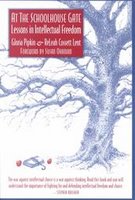Trelease begins,
More and more teachers are looking over their shoulders during read-aloud or SSR periods, worrying that someone in the community will take offense at some book. The frequency of such fears sometimes makes me wonder whether this is America or Iraq.spacer In our free and constitutional society, everyone has right to protest anything — something many citizens in other countries can't boast. Protesters have a right to protest and a right to be heard. What they don't have is the right to impose their will on others. In a nation governed by "majority rules," they have only the right to persuade the majority toward their point of view.
Books, authors, and illustrators mentioned in the article include: Gone With the Wind; Snow Falling on Cedars; Harry Potter series by J. K. Rowling; The Lion, the Witch, and the Wardrobe by C. S. Lewis; Peter Pan; Katherine Paterson's Bridge to Terabithia; Little Red Riding Hood as illustrated by Trina Schart Hyman; Ray Bradbury's Fahrenheit 451; The Seven Storey Mountain by Thomas Merton; Judy Blume's Tales of a Fourth-Grade Nothing; T. S. Eliot; Shel Silverstein; Mandy by Julie Andrews Edwards; Johnny on the Spot by Edward Sorel; Read for Your Life by Gladys Hunt and Barbara Hampton; The Goats by Brock Cole; A Day No Pigs Would Die by Robert Newton Peck; The Dark Is Rising by Susan Cooper; A Wrinkle in Time by Madeleine L'Engle; Captain Underpants by Dav Pilkey; John Steinbeck's Of Mice and Men; and The Adventures of Super Diaper Baby by Dav Pilkey, illustrated by George Beard and Harold Hutchins.
Trelease recommends two books that deal with censorship issues.
 CENSORSHIP: A Threat to Reading, Learning, Thinking by John S. Simmons
CENSORSHIP: A Threat to Reading, Learning, Thinking by John S. SimmonsThis is the more comprehensive of the two books, covering censorship threats in nearly all the academic disciplines, from elementary to high school. Its 19 chapters have been authored by national experts, writers, educators, and even school board members. The text straddles the line between excoriating censorship and the ways to negotiate one's way around it, including advice for principals, librarians, and school boards.

At the Schoolhouse Gate: Lessons in Intellectual Freedom by Gloria Pipkin and ReLeah Cossett Lent
The authors, two veteran Florida secondary teachers, describe the long, winding road they traveled in that state as they attempted to educate and expand the minds of young people through reading and writing. Their approach was often in direct contrast with the traditional approach — memorizing fact-bits to be regurgitated at test time but hardly productive when it come time to think or act critically or intelligently. The book is both inspiring and frightening in its scope and ramifications.
No comments:
Post a Comment